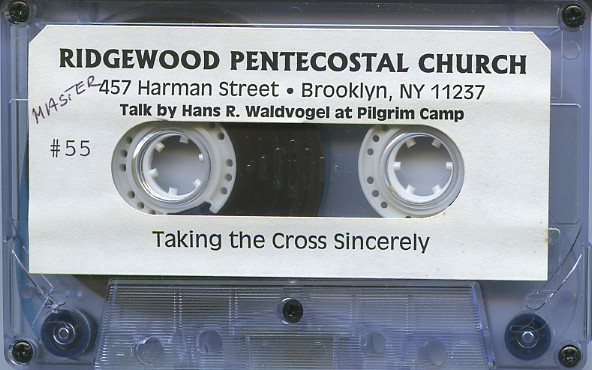Hans R. Waldvogel | Archive of Sermons and Talks
| HOME RECORDINGS BIOGRAPHY LINKS ABOUT CONTACT |
Loading...
|
|
|||
| 55A. Taking the Cross Sincerely (Is your conversation really in heaven? If not, your end is destruction.) | |||
|
Play All Philippians 3:18-20. (For many walk, of whom I have told you often, and now tell you even weeping, that they are the enemies of the cross of Christ: 19Whose end is destruction, whose God is their belly, and whose glory is in their shame, who mind earthly things.) 20For our conversation is in heaven; from whence also we look for the Saviour, the Lord Jesus Christ. Philippians 3:7-11. But what things were gain to me, those I counted loss for Christ. 8Yea doubtless, and I count all things but loss for the excellency of the knowledge of Christ Jesus my Lord: for whom I have suffered the loss of all things, and do count them but dung, that I may win Christ, 9And be found in him, not having mine own righteousness, which is of the law, but that which is through the faith of Christ, the righteousness which is of God by faith: 10That I may know him, and the power of his resurrection, and the fellowship of his sufferings, being made conformable unto his death. 11If by any means I might attain unto the resurrection of the dead. Opening:His life is “hid with Christ in God.” Jesus lived like that. He always lived in the bosom of the Father. The Bible says, “The Son who is in the bosom of the Father.” And wherever Jesus ministered, wherever He spoke, wherever He walked, He always did those things that pleased the Father. He was always controlled, always controlled—His very talk. He said, “The words that I speak unto, I speak not of Myself.” And again, He said, “I do always the things that please Him.” What a life! “Your time is always, but My time is not yet.” Oh, what a Son of God—to dwell in the bosom of the Father even while He was being crucified by wicked men! No wonder death couldn’t hold Him! No wonder death had to give Him up, and He conquered death, and He “abolished death,” and conquered hell. What a life this Son of God lived! But you know, when He says, “I will come again and receive you unto Myself that where I am ye may be also,” He’s not talking about heaven, but He’s talking about that heavenly place—that wonderful union with the Father. And do you realize that Jesus Christ is here today to do that for us? … Selected Quotes:
Isn’t that a description, though, of most Christians that we know: “They mind earthly things”? “Their end is destruction!” Now that, of course, we have ruled out of our curriculum; we don’t believe that! Why, no! We have somehow succeeded in fitting the Bible to our natural tendencies and experiences. And we’ve been very adept at doing that. But, oh, the judgment of the Bible, “their end is destruction,” ought to go to our hearts. …
Well, but who doesn’t do that? Who would have the brass to judge that or to criticize? “The desires of the flesh and of the mind” control humanity; they control Christianity! There’s but one cure, and it is death—and not the death of man, but the death of God, the death of Christ—that cross of Christ that has wrought the sentence of death upon my old man, and I have been “crucified with Christ.” …
I tell you, the cross of Christ is so real you cannot mistake it. You can’t. When God unsheathes His sword and turns it against you, you’ll lose all judgment of others. Then you will know what true humility means, where you “consider everyone better than yourself,” when God Almighty has been able by the light of the Holy Ghost to show you the destructiveness of this deceitful heart of ours—the absolute hopelessness of self. …
…
…
…
…
…
Why, we don’t even come out of our dumps—out of our sensitiveness, out of our peculiarities, out of our bondages. We don’t even find it out. The people that started out in the Spirit here, they’re not here anymore because they got sore at the preacher. They got sour inside of them instead of bowing to God’s call. “Blessed are they that are called unto the marriage supper of the Lamb.” Beloved, I’m exuberantly happy this morning to think that God still deals with us in His mercy. Oh, I’m so thankful, because I’ve known God to say of certain people, “Don’t talk to them anymore. They won’t take it. Don’t bother them anymore.” And they went on prophesying and speaking in tongues and dancing in the Spirit and all that sort of stuff, and God left them alone! He’s gone to his idols! But I tell you, if Jesus Christ finds one soul that wants Him, He will bless them by letting them partake of the bitter cup: His death. Oh, “that I might know Him, and the power of His resurrection, and the fellowship of His sufferings”! … Illustrations:Ministers who did not follow Mrs. Robinson’s example in continually seeking the Lord. “God allowed them to sink into deep mud because, presently, they began to take credit to themselves. They were ‘the gifted of God,’ they were ‘the chosen ones;’ they were ‘powerful.’ Now they told others to tarry for the baptism and they had no more time—they didn’t have to.” (from 21:17) In those days, a radio ministry in Europe was impossible. “I discovered that the saints of God did not have radios. They said, ‘That’s worldly.’ They wouldn’t have them in their homes! We think that’s fanatical, but I wonder how much better off a lot of us would be without television sets, and without some of those gadgets.” (from 24:00) The legend of Peter fleeing Rome. “Peter was leaving Rome because persecution was getting too hot…. Jesus said, ‘I’m going back to Rome to be crucified once more because you refuse to.’” (from 26:07) Stories of those who dared witness in communist countries. “We pled with her to stay in the West. … She said, ‘Well, who will preach the Gospel there if they all run away?’ … And we sit here in a fine church like this and we can’t even testify—we’re not ‘comfortable.’ And we can’t spend an hour’s time to pray. We ‘haven’t got time.’” (from 27:08) The example of the Norwegian man who prayed Hans Waldvogel through to the baptism. “Mind you, he stayed until four o’clock in the morning.” (from 28:58) Christians act like the sorcerer’s apprentice. “That’s what’s the matter with us: we ‘crucify the flesh,’ but we raise a thousand old Adams, and they all trouble us.” (from 30:33) German at 11:37:Genesis 6:3. “…Die Menschen wollen sich von meinem Geist nicht mehr strafen lassen…” — “Men will not be disciplined by the Spirit of God.” The King James Version says, “My spirit shall not always strive with man.” References:HRW reveals that the Persian mission he mentions in several recordings was located at N. Sheffield Ave. & W. Montana St. in Chicago. Date: “That light has been shining here for 33 years.” That would place this recording around 1958. Audio Quality: Poor More Information... Project Notes: The original tape says, “Talk by Hans R. Waldvogel at Pilgrim Camp.” We ran light hiss reduction. There is a great deal of low frequency noise on this recording, centered around 88Hz or so. The DeHummer was not used, but some graphic equalization was done instead. Downstream of this EQ, the compression was run. A couple coughs and stutters were removed (e.g. 9:01), a long pause shortened, and very many clicks and pops were manually removed, while much noise remains. After editing, the speed of the recording was increased to 98.25% of the edited duration.
The original media and project files are available upon request. | |||
|
 Back to 54
Back to 54



